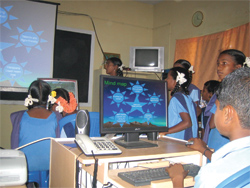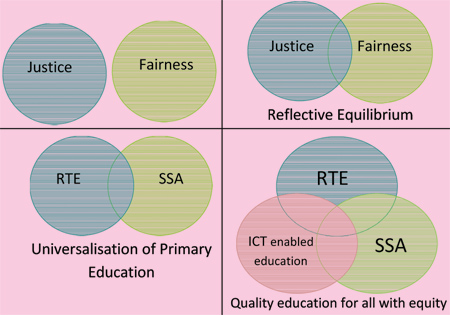 This paper argues that Information Communication Technology (ICT) enabled education should be an integral part of the Right to Education Act (2009) passed by the Parliament of India. This paper also presents an ethical argument for the formulation of a National Policy that would ensure ICT Enabled Education as a part of Sarva Shiksha Abhiyan (SSA)
This paper argues that Information Communication Technology (ICT) enabled education should be an integral part of the Right to Education Act (2009) passed by the Parliament of India. This paper also presents an ethical argument for the formulation of a National Policy that would ensure ICT Enabled Education as a part of Sarva Shiksha Abhiyan (SSA)
Sarva Shiksha Abhiyan (SSA) or 'Education for All' was a massive programme instituted by the Government of India in 2000-2001 to enroll 205 million children in schools and retain them until they complete primary schooling. Right to Education (RTE) Act 2009, which ensures education for all children in the age group of 6-14 years, came into effect from April 1, 2010 and SSA is the vehicle to implement the RTE. Assessment of the SSA by the Joint Review Mission (2009) indicates a considerable increase in the enrollment rate while nearly 2.7 million children drop out of school every year. According to Karin Hulshof, United Nations Children Fund (UNICEF) Representative-India, the RTE would directly benefit about millions out-of-school children in the age group 6-14 years ensuring quality education; this would also lead to the increase in the economic productivity of the country. Despite the tremendous success of the SSA, the challenges to the universalisation of primary education are manifold. This paper proposes that an ICT enabled education, as a right to education has the potential to transform the system of education under the SSA and also address key issues such as increasing number of out-of-school children, dearth of qualified teachers and imparting quality education. Children belonging to the economically weaker sections of the society often lack access to quality education at the primary school level and tend to remain as unskilled labourers languishing without any hope or opportunities for upward mobility. Such a situation has major implications for India's economy and socio-political development. In this context, the prospects of ICT enabled education as an integral part of the right to education holds significance particularly as an effective tool of imparting education to the poor and rural children. The computer-aided education could be utilised to facilitate creative teaching and to make the process of learning more informative and interactive. Introduction of ICT enabled education as part of the SSA also has the potential to attract the under-privileged children to school, accelerate the rate of enrolment and retain children in schools. A national policy on ICT enabled education as a right to education assumes greater significance as the Government of India is intent on preparing the future generations to face the challenges of 'knowledge economy' of the digital world lest the 'digital divide' that creates a chasm between the information rich and the poor widens the socio-economic inequities drastically. An ICT oriented SSA does not aim at creating technocrats for the global economy but would rather harness the potential of the computer aided technology to provide a knowledge platform for those who need it the most, which would enable the development of the marginalised and the deprived sections of the society and the development of the community as a whole.
This article analyses why ICT enabled education should be mandated with the SSA beginning with the under-privileged segments of the Indian society as a moral imperative based on John Rawls' theory of justice. An ICT enabled education becomes a right when viewed from the paradigm of social justice. John Rawls in his Theory of Justice advocates two principles of justice based on rational choice theory to ensure equitable political and social arrangements in a society. The ICT enabled education as a right to education is justified under the 'difference principle' that advocates positive discrimination in favour of the deprived sections of the society.

Right to ICT Enabled Education
John Rawls, one of the foremost American political philosophers of the 20th century, advocates two foundational principles of justice for establishing social and political institutions that would ensure equity. The first principle of justice ensures equal civil and political rights while the second one emphasises fair equality of opportunities in the distribution of socio-economic advantages in the society. The 'difference principle', which is part of the second principle, emphasizes the need for the social systems to be advantageous to the less privileged in the society without adversely affecting other segments of the society. Rawls notes that '




















